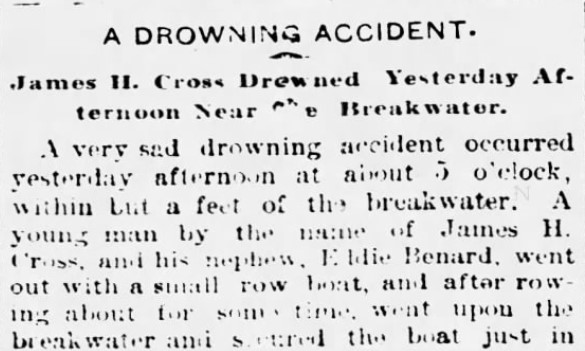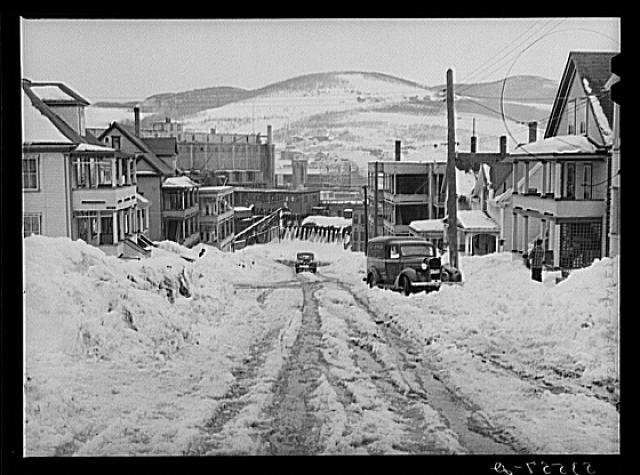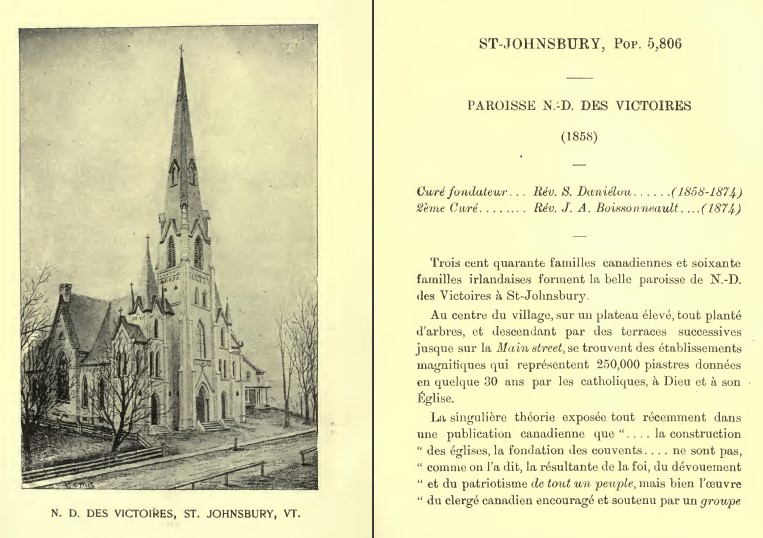Good luck finding a French Canadian who has no personal connection to the grande saignée, the wave of emigration that afflicted Canada from 1840 to the Great Depression.
I, for one, could mention my own great-, great-, great-, great-grandparents, Joseph and Dorothée Royer, who spent several years in the United States around 1830. Wave after wave of men and women in my Lacroix line went south starting in the 1840s—François and Michel fought in the Mexican-American War, James perished on the Burlington breakwater in 1890, and Orrin settled on a Vermont farm in the 1920s. My great-grandmother, a Gagnon, was a mill girl in Lowell at the dawn of the twentieth century; her grandfather had preceded her on American soil in the 1850s.
Even after substantial genealogical research, however, it was some time before it really dawned on me that the grande saignée is part of my story. Despite the event’s significance, Quebec’s high school history curriculum gives this mass migration little space. Some Quebeckers of a certain age need no introduction to the subject, having met or visited American cousins in their youth, but the diaspora has largely left our collective historical consciousness. And yet, it shaped the province’s policy directions and religious discourse; encouraged the colonization of Quebec’s outer regions; and favored the gradual Americanization of French-Canadian culture just as elites fought back to protect faith, language, and customs.

As a modern-day migrant, it took me little time to become reacquainted with this movement of people long relegated to some obscure corner of my historical baggage. At the University of New Hampshire, a confluence of circumstances—including my French tongue, experience with Canadian Catholic history, and eagerness to engage in transnational history—led me down the path of Franco-American studies. Through my time as a doctoral student, work on Franco-Americans would come more easily than dissertation-related research.
When I confided this to a fellow grad student, who was tackling Francos in her own work, she easily exclaimed, “Of course! this is your story.” None of my direct ancestors settled permanently in the United States, yet Franco-Americans’ history is also mine—it is entwined with that of my own forebears.
But in truth I have never engaged in this field out of a sense of honoring ancestors, or finding myself. In the last seven years, I have researched and written because there is historiographical work to be done.
Because the Franco-American narrative carries orthodoxies wildly at odds with the documentary record—documents that have their own failings and limitations, of course.
Because the influence of the French-Canadian diaspora and Franco-Americans on both sides of the border still has yet to be fully recognized.
Because there is still much we do not know about this migration and French-Canadian migrant communities, especially in their early years and in geographical peripheries.
I say this not to disparage. My research would have been impossible without Claire Quintal, Robert LeBlanc, Yves Roby, and the many, many other giants in the field. But, in history, there is never a final word. There is a lot of evidence yet to be uncovered; there is much to be done to bring Franco-American stories in conversation with the present.
When I first entered the field, it seemed as though I was stepping into a vast vacant lot—one by one, many leading scholars had by then moved on in various ways. There was greater truth to that feeling in 2012 than there now is, but I was still wrong in some respects. Mark Richard and Yukari Takai had recently penned major monographs. Articles on the subject still appeared in academic journals at a steady pace. The Presses de l’Université Laval published works touching on the larger North American francophonie. Blogs and community organizations brought broader interest to the subject. All of this still holds, with both research and interest growing. Recently, Franco-American history welcomed, thanks to David Vermette, the first original survey book in over twenty-five years.
Recent initiatives like Bienvenue New Hampshire and the Je Me Souviens Project are taking the Northeast’s French culture in different but equally exciting directions. The French-Canadian Legacy Podcast, also new in the realm of Franco-American studies, is spreading the word about this important aspect of New England’s cultural landscape. Several years ago, a colloquium titled French Connections, held in Burlington, highlighted cross-border connections past, present, and future. At last, in addition to many other events and cultural productions, the observance of Francophonie Day continues in state capitals across the region.
To put it simply, this is an exciting time to be engaging with Franco-American history.

My work in this field has been a labor of love and it has been a thrill to contribute blog posts, journal articles, podcasts interviews, conference presentations, and more to the field.
And yet, there is still much more research to be done, and to those who have an interest in the subject, I would emphasize the following areas especially as worthy of our attention:
- We must continue to assert Franco-Americans’ inescapable impact on the social, cultural, and economic landscape of the U.S. Northeast as well as Quebec.
- We must explore that significance without accepting received knowledge as definitive. As noted above, history must be rewritten as we uncover sources, refine our methodological and conceptual approaches, and reinterpret the past in light of present concerns. We should not be contrarians simply for the sake of debate, but challenge orthodoxies that rest on shaky ground.
- We must look to the peripheries of the field in terms of geography, gender, class, and more. As I have argued, the Franco-American communities of small towns and middling cities are too often overlooked by researchers. Here in New Hampshire I need only mention Berlin and the whole of Coos County, the industrial cities along the Salmon and Cocheco rivers, Newmarket and Exeter in the Seacoast region, Claremont and Lebanon, the Lakes Region—in short, everywhere but Manchester and Nashua! How richer and more complex would our narratives be if only we dedicated serious study to these varied areas of settlement!
- We must continue our efforts in three directions: with high school and college students, with the general public, and with other researchers, whose primary interest may not be Franco-American history, but for whom the subject may be highly relevant. In time, through academic work and conversations, Franco-Americans may find their place in standard textbooks.
- We must inspire young people—younger than me—to take interest in the subject no matter their own cultural background. Franco-American history provides tremendous insight into the larger course of the Canadian and American pasts.

This is no petit chantier. I hope you will join me in this endeavor. In the meantime, if you know someone who might have an interest in the topic, do not hesitate to share this blog with them. You may also find this list of resources interesting and valuable.
The blog will be silent next week as I prepare for the Franco-American Centre’s annual “Rassemblement” in Orono. I will be discussing Franco-Americans’ experience of the First World War alongside Mark Richard and Elisa Sance, with David Vermette as our panel chair. Many thanks, in advance, to Susan Pinette, for this opportunity.
Dear Pro.Lacroix,
We have a Franco society in the Albany, NY area, the Franco American Federation of New York. We One of our goal is to make known the French history of North America. I would like to use your information in the article “British North American Soldiers Who Enlisted in the U. S. Army Dutring the Mexican-American War (1846-1848).” I would obviously give you full credit. Thank you for the kind attention you will bring to my request.
Sincerely,
Bernard Ouimet
Dear Bernard,
I am again very grateful for your interest in my research. You are most welcome to utilize the data I have collected on Canadian-born soldiers. That information is available here: http://querythepast.com/canadians-mexican-american-war/
For a limited time, my journal article on the subject is available free of charge through the link at the bottom of this post on the UTP Journals website: http://blog.utpjournals.com/2020/09/21/from-british-america-to-buena-vista-canadians-in-the-mexican-war/
Do not hesitate to reach out if I can be of further assistance.
Thanks again,
Patrick